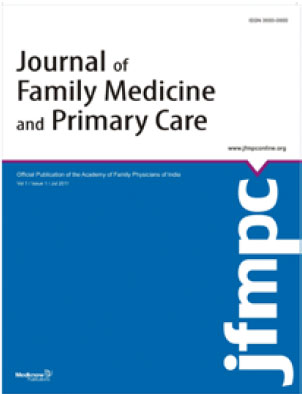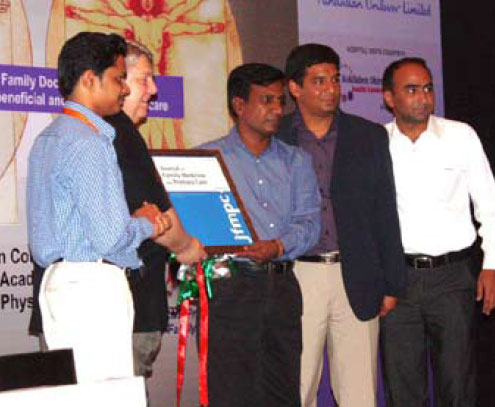Indian Journal of Family Medicine and Primary Care launched
www.jfmpc.com
The first issue of the Journal of Family Medicine and Primary Care (JFMPC) covering January - June 2012, Vol 1 Issue 1, is published. JFMPC is the official publication of the Academy of Family Physicians of India (AFPI). Dr Raman Kumar, President AFPI is also the chief editor of the JFMPC.

The important highlights are following -
- It is first ever peer reviewed family medicine journal in India
- It is the only family medicine journal available online in south Asia at present.
- It is free access and authors are not charged for processing of the manuscripts.
- Papers are welcome from all over world.
- 5The journal is indexed with Caspur, EBSCO Publishing's Electronic Databases, Expanded Academic ASAP, Genamics JournalSeek, Global Health, Google Scholar, Health and Wellness Research Center, Health Reference Center Academic, Hinari, Index Copernicus, Indian Science Abstracts, MANTIS, OpenJGate, PrimoCentral, ProQuest, SCOLOAR, SIIC databases, Summon by Serial Solutions, Ulrich's International Periodical Directory
- The editor is also working on indexing with pubmed - medline.
The current issue, which features a large number of articles including one about The Spice Movement (WONCA’s young doctors’ movement in the South Asia region) is available at http://www.jfmpc.com/currentissue.asp?sabs=n
In this issue, in his inaugural editorial1, Dr Kumar makes some interesting observations. (Excerpts from this editorial follow)
Primary Care in India
Primary care was first emphasized in Sir Bore Commission report in India at the time of independence. Bore committee envisioned a three-tier healthcare delivery system with a well organized referral system. Primary care gained central position in policy making after Alma Ata declaration in 1978. Primary care is a broad concept and its outcome is dependent on optimal performance of several sectors interwoven within the health system.
Unfortunately, in India, medical education is entirely based in tertiary care setting and is provided at academic medical colleges. Medical professionals and community health facilities, operating outside of the tertiary care system, have no participation in medical education. Though the purpose of basic MBBS training is to prepare a competent family medicine doctor, the concept doesn't appear in the undergraduate MBBS curriculum. As an outcome, a large section of medical students, faculty and practitioners are not aware of the advantages of family medicine approach. Therefore, at the point of service delivery, what we often see is an extreme of high-end tertiary care intervention or a minimalistic public health approach.

WONCA President Professor Rich Roberts (second from left) at the journal inauguration with (from l to r) Drs Bijayraj, Raman Kumar, Piyush Jain, and Navneet Singh Gill
Over the last several decades family medicine has evolved and established itself as a specialty for skilled primary care physicians.
Though the concept of "family medicine" has received attention in several policy discussions of Government of India including the National Health Policy 2002, recognition and implementation in academic setting is yet to be seen. Most of the developed nations have evolved advanced structures for academics as well as delivery system based on family medicine; good progress has been observed in neighbouring countries of India such as Nepal, Sri Lanka and Pakistan. Recently Medical Council of India (MCI) has also notified curriculum for post graduate MD family medicine.
Family Medicine in India: Recent Developments
With the intention of advancing family medicine and primary care research, policies, and practice, we proudly present to you the Journal of Family Medicine and Primary Care (JFMPC). The journal will serve as a pioneer in the South-East Asian region to advance the academic discipline of family medicine. With this overarching goal, the JFMPC:
- Seeks to foster academic communication and interdisciplinary research among primary care providers engaged in various settings. The journal will cover broad spectrum of clinical topics catering to the academic needs of family physicians, urban general practitioners (GPs), rural physicians, national rural health mission (NRHM) doctors, community surgeons, community health workers, providers of community-based maternal and child health, emergency physicians, occupational physicians
and public health specialists. The journal will publish original articles on clinical studies, theories, and policies related to the discipline of family medicine and primary care.
- Acts as an interactive forum for primary care providers, policy makers, healthcare administrators, community leaders, social scientists and healthcare funding agencies towards provision of cost effective, personalized, continued, comprehensive, holistic form of health care to individuals, families and communities.
- Invites physicians of first contact as well as other health providers to document reflections of their own practices and experiences towards accumulating a wealth of scientific evidence enriching academics in primary care. We welcome your submissions to accomplish the values and mission of primary care and family medicine as a scientific and practice-based discipline.
- Advocates academic institutionalization of community health services through processing of data and evidence on health interventions focused at individual, family and community level. We also invite discussions and debates on evaluation of training programs, faculty development, curriculum standardization, and development of practice standards and protocols.
- Encourages tradition of scientific writing among primary care providers in India and South Asia. Primary care providers shall function not only as foot soldiers but also as leaders, contributing to the growth of this knowledge discipline; facilitating local clinical governance and accountability. Implementation of the concept of family medicine requires a paradigm shift in the medical education system; from biomedical focus to patient centered approach, and to promote this shift, manuscripts are sought by the JFMPC.
A battery of critically linked interventions is required as stakeholders work together for academic institutionalization of community health services. There is a need to evolve background documentation and consensus on standards for locally relevant practice and teaching of family medicine in India and South Asia. JFMPC seeks to fill these critical gaps. Given the challenging scenario, such a journal is automatically positioned to play manifold roles. Your submissions are welcome!
Full article available online:
1. Kumar R. Empowering primary care physicians in India. J Fam Med Primary Care [serial online] 2012 [cited 2012 May 13];1:1-2.